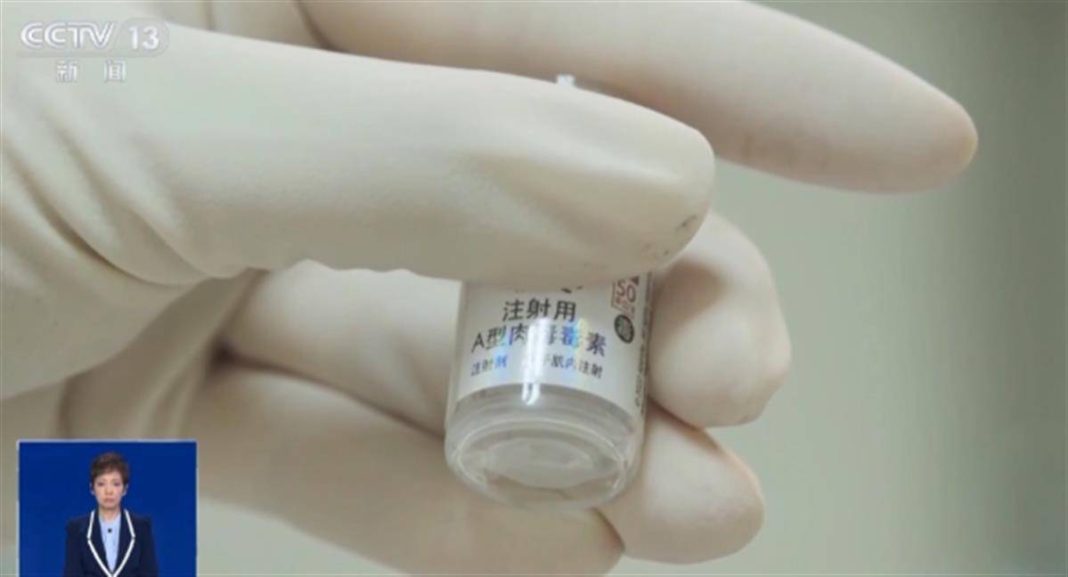Recently, the Emergency Department of the First Affiliated Hospital of Zhejiang University School of Medicine admitted several patients who collapsed after receiving botulinum toxin injections.
In early July, a 25-year-old beauty named Lulu was brought to the emergency department of the hospital. Lulu sat paralyzed in a wheelchair, speaking intermittently and unclearly.
After struggling to communicate with her and with the help of her “interpreter” friend, the emergency experts learned that Lulu not only felt dizzy, weak, and unable to see clearly, but also had difficulty swallowing and breathing. Her throat felt like it was stuffed with cotton, making it hard to swallow water and food, causing difficulty in breathing and walking.
It turned out that 10 days prior, Lulu had visited a nearby beauty center for treatment. Encouraged by the salesperson, she opted for the “botox” treatment, injecting 100u of botulinum toxin into each cheek as well as receiving two free injections of botulinum toxin into her forehead to remove wrinkles.
Unexpectedly, the day after the injections, Lulu began experiencing dizziness, weakness, and numbness in her tongue. She struggled to eat, feeling like her tongue was unresponsive and unable to push food down. In the following week, her vision blurred, she had double vision, and found it difficult to swallow solid food, experiencing coughing fits while trying to drink water or eat congee. In fear, she sought help and was brought to the hospital.
After a series of examinations, attending emergency physician Tong Yaling diagnosed Lulu with “botulinum toxin poisoning.” Through targeted treatment with botulinum antitoxin and other supportive therapies, she was admitted to the emergency poison ward, where her condition gradually improved.
“Since June this year, the emergency department at Qingchun campus has treated several cases of botulinum toxin poisoning in patients. We hope individuals seeking beauty enhancement will prioritize safety and remain vigilant,” said Chief Physician Lu Yuanqiang, head of the emergency department, noting that these patients were mainly young women in their twenties receiving treatments such as anti-wrinkle injections or body sculpting injections. The number of such cases has been increasing in recent years.
Dr. Lu Yuanqiang explained that botulinum toxin, also known as “botulinum neurotoxin,” is a harmful protein excreted by the bacteria Clostridium botulinum during its growth. This toxin possesses strong neurotoxicity, inhibiting the release of acetylcholine at the nerve-muscle junction, leading to muscle relaxation and paralysis. Clinically, botulinum toxin is used to treat conditions such as eyelid spasms, facial spasms, and strabismus.
In recent years, botulinum toxin has shown promising results in various treatments like wrinkle reduction, facial sculpting, leg reshaping, hyperhidrosis treatment, and scar reduction, gaining popularity in the field of aesthetics.
“Botulinum toxin is highly toxic, and improper dosage or the use of counterfeit products during aesthetic procedures can lead to poisoning and life-threatening situations,” emphasized Dr. Lu Yuanqiang, highlighting the importance of correct and standardized usage.
Dr. Xu Jinghong, head of the Department of Plastic Surgery at Zhejiang University Hospital, mentioned that botulinum toxin is a controlled substance regulated by the state. Cases of botulinum toxin poisoning following aesthetic injections in formal medical settings are extremely rare, with most poisonings occurring in unauthorized beauty injections.
Currently, there are only four approved brands for injecting Type A botulinum toxin. Industry consensus specifies that each injection should not exceed 300U, and patients should be informed by experts in plastic surgery that they can receive treatment for only one area at a time, with intervals of at least 3 weeks to 3 months before subsequent injections to prevent resistance and ensure effectiveness. Prior to injections, allergy histories should be reviewed, and skin tests may be conducted if needed. Therefore, individuals seeking aesthetic procedures are urged to choose reputable institutions.


